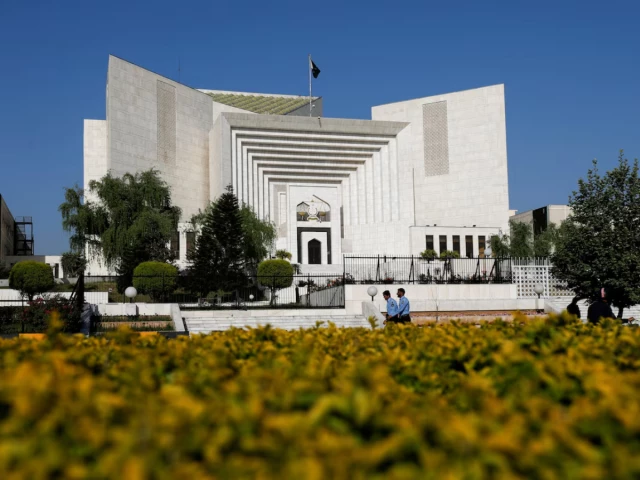Police officers walk past the Supreme Court of Pakistan building, in Islamabad, Pakistan April 6, 2022. REUTERS
ISLAMABAD:
The Supreme Court has sounded the alarm over systemic impunity for violent crimes against women, highlighting that the justice system continues to fail those most vulnerable to brutality.
In a seven-page judgment written by Justice Athar Minallah, the court sounded the alarm over rising cases of violence against women, observing that the judiciary, over the past 12 months, has dealt exclusively with appeals arising from convictions involving capital punishment or life imprisonment.
“Alarmingly, a significant number of these cases involve defenseless women – mothers, sisters and wives – brutally killed for reasons that are often trivial, dubious or based on misplaced notions of honor. »
The judgment says these cases “reveal a justice system that appears to serve the privileged and not the weak.”
A three-judge bench, by a 2-1 majority, upheld the death sentence of a husband who murdered his 28-year-old wife in a Gujarat family courtroom. Justice Malik Shahzad Ahmad Khan disagreed and converted the death sentence to life imprisonment.
The majority found that the manner of the killing was “brutal and shocking”, thereby making him subject to fasad-fil-arz under Section 299(ee) of the Pakistan Penal Code.
The record shows that the deceased was admitted to Dar-ul-Aman, Gujrat, on December 18, 2013, and was produced before the family court by police officers. She was sitting in the courtroom, waiting for her case to be heard, when the appellant entered and shot her several times in front of the presiding judge.
The judgment exposed deep flaws in investigations and accountability in cases involving marginalized women. He noted that investigations into crimes against the destitute or disadvantaged are often “compromised, poorly conducted or deliberately made ineffective”, while cases involving people with privileged social status receive much more attention and institutional action.
“Public attention, institutional response, and media coverage appear to be proportionately influenced by the social status of the victims when the crime occurs within a privileged class, the investigation tends to be vigorous, and the issue receives extensive coverage in the electronic and print media.”
“However, violence against women belonging to disadvantaged and marginalized segments of society rarely evokes urgency or a similar institutional response,” the judgment notes.
He added that the judiciary’s workload over the past year “reveals a serious lack of deterrence” in crimes against disadvantaged women.
The ruling warns that “a state where such impunity reigns – where women can be killed or brutalized without consequence and where justice depends on privilege – has failed in its most fundamental duty to protect the lives, dignity and equality of half its population.”
He adds that the selective application of justice reflects “the moral collapse of governance and society,” transforming the state into “the domination of the few, for the few.”
“A state that only protects the powerful and abandons the most vulnerable has ceased to function as a constitutionally governed republic.”
The judiciary expressed hope that the legislature and the executive “will take effective measures to put an end to this impunity”.




